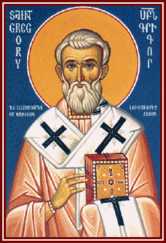Readings:
Ecclesiastes 2:1-11
Psalm 33:6-11
Acts
17:22-31
Mark 2:18-22
Preface of Apostles and Ordinations
[Common of a Missionary]
[Common of a Pastor]
[For the Ministry II]
[For the Mission of the Church]
PRAYER (traditional language)
Almighty God, who didst raise up thy servant Gregory to be a light in the world, and to preach the Gospel to the people of Armenia: Illuminate our hearts, that we also in our own generation may show forth thy praise, who hast called us out of darkness and into thy marvelous light; through Jesus Christ our Lord, who liveth and reigneth with thee and the Holy Ghost, one God, now and for ever.
Amen.
PRAYER (contemporary language)
Almighty God, who raised up your servant Gregory to be a light in the world, and to preach the Gospel to the people of Armenia: Illuminate our hearts, that we also in our own generation may show forth your praise, who called us out of darkness and into your marvelous light; through Jesus Christ our Lord, who lives and reigns with you and the Holy Spirit, one God, now and for ever. Amen.
Lessons revised at General Convention 2024
Return to Lectionary Home Page
Webmaster: Charles Wohlers
Last updated: 25 Jan. 2025
GREGORY THE ILLUMINATOR
APOSTLE TO ARMENIA (23 March 332)
 The
ancient kingdom of Armenia was the first country to become Christian,
and it recognizes Gregory as its apostle. Armenia was a buffer state between
the powerful empires of Rome and Parthia (Persia), and both of them sought
to control it. Gregory was born about 257. When he was still an infant,
his father assassinated the King of Parthia, and friends of the family
carried Gregory away for protection to Caesarea in Cappadocia, where he
was reared as a Christian. About 280 he returned to Armenia, where he
was at first treated severely, but eventually by his preaching and example
brought both King Tiridates and a majority of his people to the Christian
faith. About 300, Gregory was consecrated the first bishop of Armenia.
He died about 332. Armenian Christians to this day remember him with honor
and gratitude.
The
ancient kingdom of Armenia was the first country to become Christian,
and it recognizes Gregory as its apostle. Armenia was a buffer state between
the powerful empires of Rome and Parthia (Persia), and both of them sought
to control it. Gregory was born about 257. When he was still an infant,
his father assassinated the King of Parthia, and friends of the family
carried Gregory away for protection to Caesarea in Cappadocia, where he
was reared as a Christian. About 280 he returned to Armenia, where he
was at first treated severely, but eventually by his preaching and example
brought both King Tiridates and a majority of his people to the Christian
faith. About 300, Gregory was consecrated the first bishop of Armenia.
He died about 332. Armenian Christians to this day remember him with honor
and gratitude.
Armenians were the first people to adopt Christianity as the state religion.
Tertullian and Eusebius of Caesaria suggest that Christianity was practiced
in Armenia as early as the 2nd century. Eusebius also mentions an exchange
of letters between Jesus Christ and the Armenian king of Edessa Abkar
V (the Black) (9-46 A.D). Legend claims for Armenian the graves of four
apostles: Bartholomew, Simon, Thaddaeus, and Jude. It was sometime
between 288 and 301 that St. Gregory the Illuminator (Grigor Loussavorich
: ca. 240-332), who had been subjected to cruel tortures and incarcerated
in a deep well (Khor Virab) for 13 years for refusing to participate in
pagan rites, converted King Tiridates (238-314). In 302, St. Gregory
was ordained bishop, and in 303 he founded the Cathedral of Etchmiadzin,
near Mount Ararat, which, to this day, is the seat of the supreme patriarch
or catholicos, the head of the Armenian Church. St. Gregory went on to
evangelize several other Caucasian nations and baptized the kings of Iberia
(Georgia), Lazes and Albania. Sometime before his death he retired to
a solitary life in the wilderness. The patron saint of Armenia, he is
now venerated in both the Eastern and Latin Church.